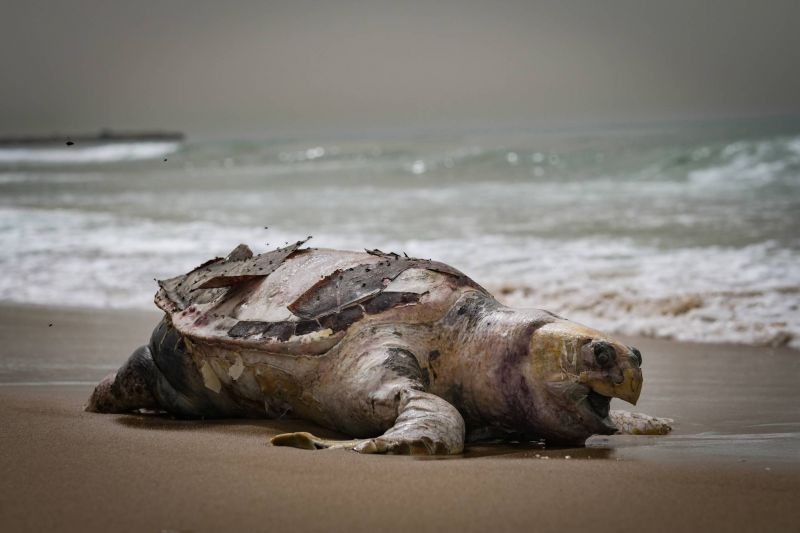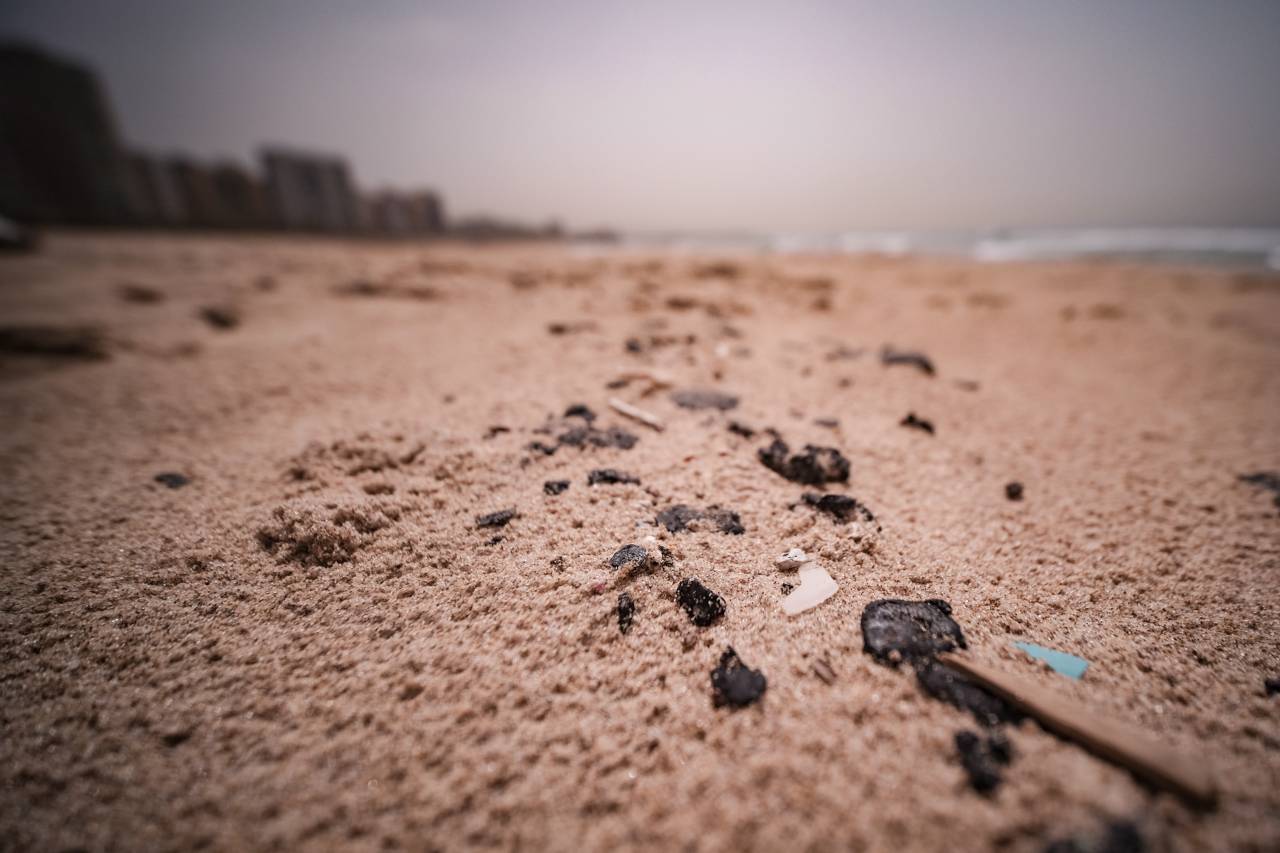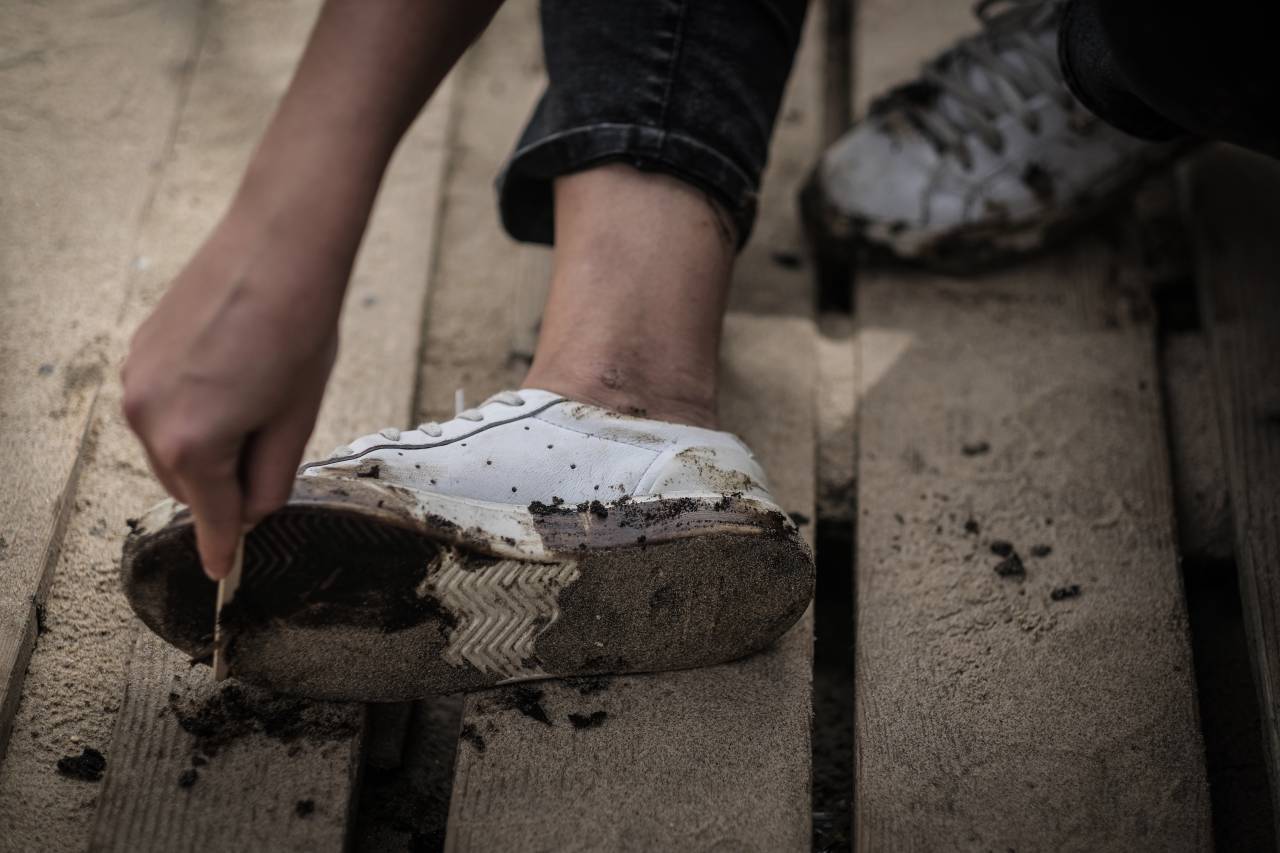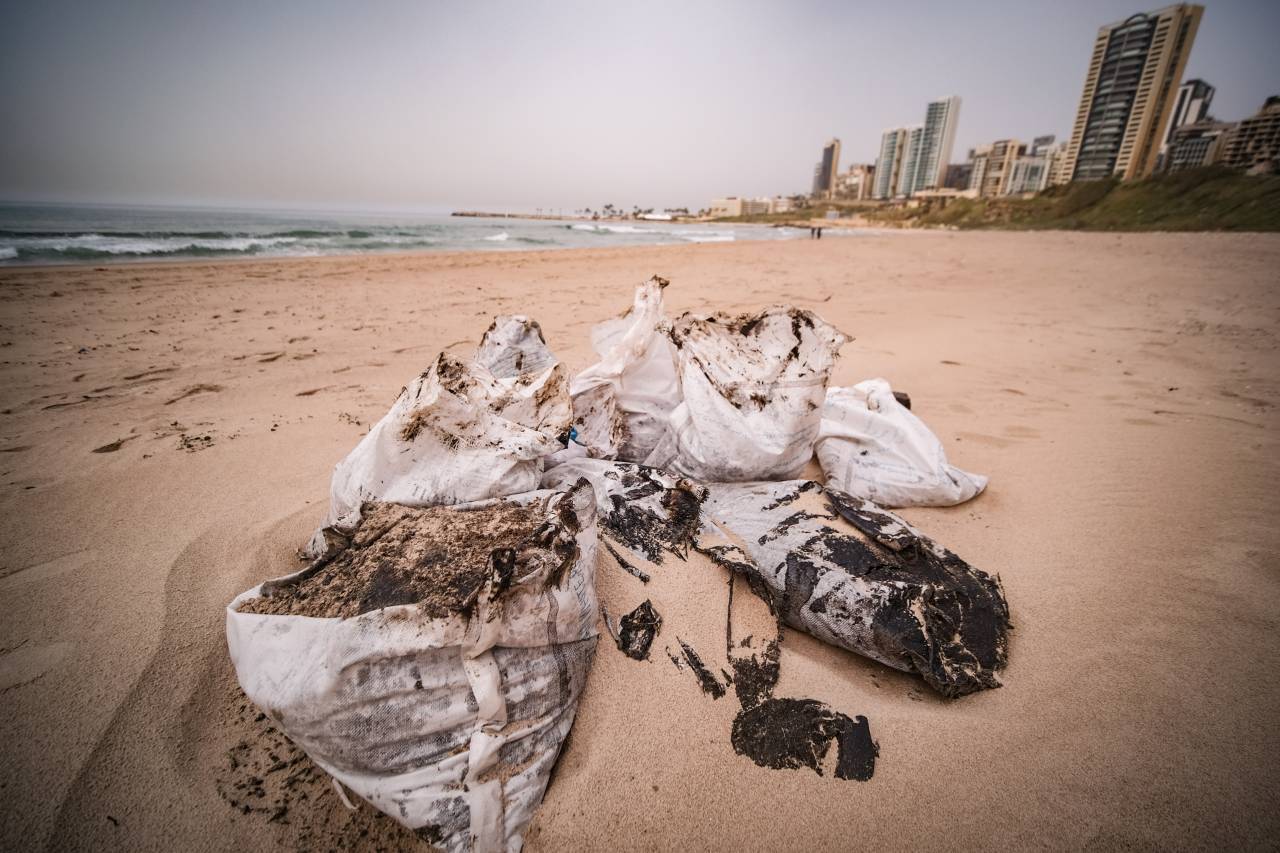
An oil spill off the coast of occupied Palestine has seeped up Lebanon’s coast, with disastrous effects for the country’s environment and wildlife, including the endangered loggerhead turtle. (Credit: João Sousa/L’Orient Today)
BEIRUT — From afar, Beirut’s last public beach, Ramlet al-Baida, seems inviting. But after walking for 20 minutes along the sandy stretch of shoreline, the bottoms of one’s shoes are coated in black oil.
Black sticky globs of tar, small and medium in size, are buried in the sand like macabre confetti. The forgotten corpses of two turtles lie close to the water, the shell of one entirely black.
In early February, a storm flung tons of oil onto the beaches of occupied Palestine to Lebanon’s south. Initial reports suggested the oil may have leaked from a ship passing near the coast, but the source of the spill has not yet been officially determined.
Within days the spill seeped up to Lebanon’s shores, where clumps of oil polluted the coastline spanning from the border town of Naqoura to the southern city of Sur.
Over the past month, winter storms and strong currents have repeatedly washed ashore more residual black oil deposits; these have now stretched up the entire Lebanese shoreline, reaching as far north as Batroun and Tripoli.
“At first about 40 kilometers were affected. Now, out of [Lebanon’s] 220 kilometers [of coastline], around 180 kilometers of the coast are affected,” Milad Fakhri, the director of the National Center for Marine Sciences under the National Council for Scientific Research, known by its French acronym CNRS, told L’Orient Today.
“Every day we are discovering a newly affected area,” Fakhri said.
According to a recent CNRS report obtained by L’Orient Today, 20 beaches have been extremely polluted by the oil particles, including Naqoura, the Sur Coast Nature Reserve and Ramlet al-Baida, and 12 have been moderately polluted.
Scientific experts warn that the spread of oil deposits is getting worse over time. Nearly two months after the spill, the government’s response to the disaster has been minimal at best, with officials failing to secure the funds and manpower needed to clean up the shoreline adequately.
A national plan or budget for the disaster has not yet been established.
Lebanon’s environmentalists are assessing the potential long-term impact of the spill, and stress that the cleanup could take months.
Environmental damage
The oil spill, which is believed to have taken place between Feb. 6 and Feb. 10 off the occupied Palestinian coast before hitting Lebanon’s coast, has reportedly been described by Israeli officials as “one of the worst ecological disasters” in the country’s history. Israeli Prime Minister Benjamin Netanyahu said that about $14 million has been allocated to clean up beaches.
In Lebanon, the effects of the spill came without warning.
“There was no monitoring, no detection or early warning of this. Plus we [Lebanon] are in a state of war with the Israelis. We do not cooperate together. So when the oil spill reached their shores, it was already too late for us to respond,” Ziad Samaha, a program manager at the International Union for Conservation of Nature, said.
“This is a highly toxic contaminant material. … This will not break [up and dissolve] easily into the water or the environment. It will stay there, and it will stay forever,” Samaha said.
 Oil washed ashore in Lebanon “will not break [up and dissolve] easily into the water or the environment. It will stay there, and it will stay forever,” says Ziad Samaha, program manager at the International Union for Conservation of Nature. (Credit: João Sousa/L’Orient Today)
Oil washed ashore in Lebanon “will not break [up and dissolve] easily into the water or the environment. It will stay there, and it will stay forever,” says Ziad Samaha, program manager at the International Union for Conservation of Nature. (Credit: João Sousa/L’Orient Today)
He added that the disaster will also have an economic impact, warning that both local and international tourists will not be able to enjoy the country’s beaches this summer.
“If we lose the southern beaches and lose their economic value, it’s going to be a social and economic disaster on the people who live there and on their livelihood. … It’s not just environmental impact,” Samaha said. “If tourists are less likely to go to the beaches, then they’re less likely to spend money at local shops and restaurants in the areas that rely on tourism.”
Fakhri said the CNRS is in the process of running tests to assess the impact of the spill on marine creatures and water pollution levels.
Zahi Chahine, who heads the government’s risk management unit, warned that the more time it takes to clean up the beaches, the harder it will become to remove the tar.
“It might take another month to finish the cleaning, but the problem is that large quantities of tar will be buried under the sand, and it will be very hard to see and clean,” Chahine said.
The Sur Coast Nature Reserve, an important nesting site for endangered loggerhead and green sea turtles, remains one of the most badly polluted areas.
“Three baby turtles that were submerged in oil suffocated,” said Nahed Msayleb, the reserve’s director.
“We fear that the residue will stay in the environment ... and dissipate into the ecosystem or in the sand dunes that are the nesting site of the turtles,” Msayleb said.
Authorities’ response
On March 4, Parliament’s environment committee formed a crisis cell to coordinate a response to the pollution the oil spill was causing to Lebanon’s shoreline.
The meeting was attended by caretaker Prime Minister Hassan Diab, the risk management unit affiliated with the prime minister's office, the CNRS and the ministers of environment, defense and public works and transport.
Chahine, the head of the risk management unit, told L’Orient Today that the meeting helped divvy up the responsibility for the response among officials and ministries.
“The Environment Ministry calls the UN and the World Bank to get support in the environmental aspect of the crisis, and the Public Works and Transportation Ministry is responsible for … storing [the bags of collected oil] and disposing of it properly,” Chahine said.
However, the officials did not establish a budget to pay municipal workers, who are desperately needed to clean up the pollution on the coast.
No additional meetings to address the oil spill have been held.
 Two months after the spill, oil still cakes the shoes of beachgoers at Beirut’s Ramlet al-Baida. (Credit: João Sousa/L’Orient Today)
Two months after the spill, oil still cakes the shoes of beachgoers at Beirut’s Ramlet al-Baida. (Credit: João Sousa/L’Orient Today)
Shortly after the oil appeared on Lebanon’s shoreline, the Foreign Ministry filed a report to the United Nations on the damage caused by the spill.
The Foreign Ministry in a statement said the report highlighted the “extent of the damage that can be described as an environmental disaster,” adding that it could take years to undo its consequences. It called on the UN to determine the cause of the spill and those responsible for it “so that Lebanon can claim compensation” for the damage. L’Orient Today requested a copy of the full report, but none was provided.
CNRS’ Fakhri warned that an adequate cleanup, which may take months even with help, would not be possible without an earmarked budget to pay workers.
“You need a strategy with paid workers so the shore can be cleaned,” Fakhri said. The government “agreed to find a way to allocate the budget … but until now it has not paid the municipalities.”
Sur Municipal Union head Mayor Hassan Dabouq said the municipality had received “no help at all” from the government. He said that some basic equipment had initially been provided by the UN’s peacekeeping force in Lebanon (UNIFIL) and the IUCN, but “we have had no help securing workers.”
“None of the municipalities have the financial ability to pay the cost for workers. It has mainly been volunteers,” he added.
Lebanon is currently in the throes of its worst economic crisis since the end of the 1975-90 Civil War, with the national currency having lost about 90 percent of its value. The country has been without a functioning government for nearly eight months, and a 2021 budget has yet to be approved.
“We just need workers dedicated to the cleanup of the shore. … We have been asking for workers for three weeks,” Dabouq said.
While the army is typically involved in the early response and recovery of disasters, including forest fires, floods and the Aug. 4 Beirut port explosion, a spokesperson told L’Orient Today that the military had not been asked to intervene.
“We haven’t even talked about the issue before. No one has asked anything from us,” the spokesperson said. “If we get asked to work on this situation we will do it.”
Asked why the response had been so slow in Lebanon’s capital, Samer Yaacoub, the head of the Beirut governor's office, said the municipality had not been aware that the Ramlet al-Baida shore was one of the first to be polluted by the oil’s spread, which made it to the beach within the first week of the spill reaching Lebanon’s coast. Yaacoub said the municipality would be sending workers to help with the cleanup in the coming days.
Caretaker Environment Minister Damianos Kattar did not respond to several requests for comment on the matter.
Fakhri said that the overall response has been slow.
“The country is in an economic and financial deficit. The government has no money to pay,” Fakhri said. “But volunteers alone cannot complete this cleanup. They are not prepared to deal with this kind of cleanup. This is a tiring process and it will take time.”
Volunteer efforts
Samer al-Khoury, the president of the environmental committee for youth organization Minteshreen, said he has been helping organize beach cleanups across the country over the last four weeks and repeated that calls to authorities asking for help have gone unanswered.
“The cleanup is almost entirely being done by volunteers,” Khoury said. “Authorities, municipalities, the government, the Environment Ministry, no one cares. We’re telling them the issue and they’re aware of it but no one actually does anything.”
He added that every time it rains more oil particles are brought to the shore and volunteers need to return to clean up the beaches once again.
“It’ll be like we hadn’t cleaned it at all,” Khoury said.
At Ramlet al-Baida, dozens of plastic bags filled with oil particles collected by the volunteers line the beach awaiting disposal. Khoury said that over the weekends some 100 volunteers gather in various locations along the coast to help with the cleanup.
“We have removed almost three tons of oil from around Saida, Sur and Beirut. In the first two weeks, we removed about a ton and a half,” Khoury estimated.
 At Ramlet al-Baida, dozens of plastic bags filled with oil particles collected by volunteers line the beach awaiting disposal. (Credit: João Sousa/L’Orient Today)
At Ramlet al-Baida, dozens of plastic bags filled with oil particles collected by volunteers line the beach awaiting disposal. (Credit: João Sousa/L’Orient Today)
But Khoury stressed that volunteer efforts, while appreciated, are simply insufficient.
“The tools we are using are very basic — shovels and gloves — but the damage is huge,” he said. “We need more human power and we need authorities. … At this rate we won’t finish for a very long time. … It’s heartbreaking.”
Sitting on Ramlet al-Baida sipping tea and smoking shisha, Ali, 53, recalled the days when Lebanon’s coast was a tourist attraction.
“Back in 2003, this beach was full. People from all over the world used to come here, you can’t imagine. Now look at us, look at this tragedy. No tourists, no money and now even our sea is gone” Ali said.
“Look at your shoes. They're covered in oil. Do you think people will come to our beaches if oil sticks to their towels and feet?” Ali sighed. “What are we supposed to do in this country? We’re used to this, they made us used to this.”